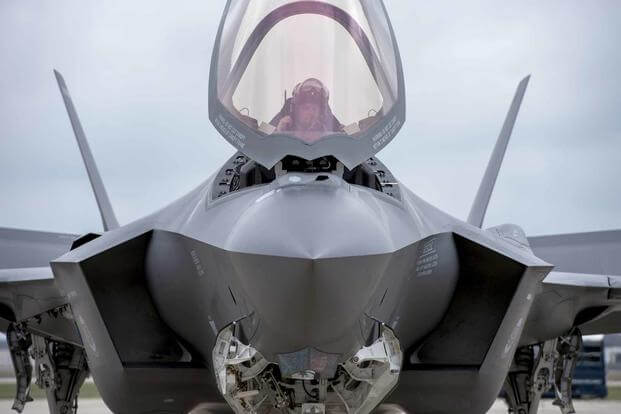The U.S. will continue to buy parts for the F-35 Joint Strike Fighter from Turkey through 2022, despite Ankara's purchase of the Russian S-400 air defense system billed as an "F-35 killer" by Moscow, the Pentagon's top acquisitions official said Thursday.
The Trump administration in July 2019 banned Turkey from participation in the multinational F-35 program. But the Defense Department had to continue buying Turkish-made parts to maintain production, said Ellen Lord, DoD's Under Secretary for Acquisition and Sustainment.
Read Next: It's Official: The ACFT Is Now the Army's Fitness Test of Record
Turkish factories currently make more than 900 parts for the F-35's center fuselage, cockpit display systems and other components, Lord said, adding that a complete cutoff in December as initially planned would result in about $1 billion in replacement costs that would slow down production of the aircraft.
"So we made a decision on a number of parts that it was smarter in terms of taxpayer dollars and warfighter readiness to let those contracts play out in Turkey so that we wouldn't have these huge termination liability costs," Lord told the Senate Armed Services subcommittee on readiness and management support. "So we have a few of the [Turkish-made] products that will go until 2022."
However, "we are well on our way" in eliminating Turkey completely from the F-35 program, "and the bulk of the parts will be out by the end of year," she said.
Over vehement objections from DoD, NATO ally Turkey began taking deliveries of the S-400 Triumf advanced air defense system from Russia in early July 2019, at an estimated cost of $2.5 billion.
Later that month, the White House announced that Turkey was being formally removed from participation in the F-35 program.
"Unfortunately, Turkey's decision to purchase Russian S-400 air defence systems renders its continued involvement with the F-35 impossible," then-White House spokeswoman Stephanie Grisham said at the time. "The F-35 cannot coexist with a Russian intelligence collection platform that will be used to learn about its advanced capabilities."
Turkish pilots were also banned from continuing their training on the F-35. The country had planned to buy about 100 of the jets.
Sen. Jeanne Shaheen, D-N.H., questioned whether the continued purchase of parts from Turkey had the potential to allow sensitive information on the F-35's stealthy technology to be passed on to Russia.
"We have worked very, very closely with Turkey" to prevent the possibility of Russia gaining an edge, Lord said, but she declined to give details, and suggested scheduling a closed session for further discussion.
Sen. Dan Sullivan, R-Alaska, the subcommittee's chairman, said he would recommend a closed session and added that he hoped the Pentagon had "learned a lesson" from Turkey's purchase of the S-400.
"Turkey's an important ally," he said, but "we can't be reliant on an ally that all of a sudden starts to be very focused on cooperation with one of our biggest strategic adversaries."
-- Richard Sisk can be reached at Richard.Sisk@Military.com.
Related: Air Force Will Get F-35 Jets Denied to Turkey After Russian Missile Buy












